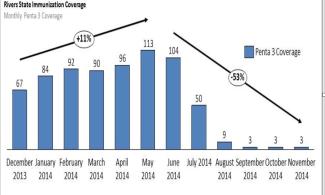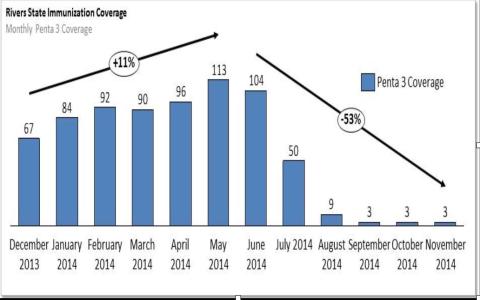
The six-month old strike of Primary Health Care Level health workers (CHEWS, CHOS, Laboratory technicians and other allied community health workers) employed by the Local Government Service Commission in Rivers State is creating chaos in the routine immunization process.

The workers commenced the indefinite industrial action on July 28, 2014, and an expert has told SaharaReporters that despite the concerted efforts of stakeholders in the state and beyond (including the Governor, the Legislature, Honourable Commissioner for Health, Executive Secretary (ES), RSPHCMB and partners), has dragged into the sixth month, with damaging consequences.
Only yesterday, Rivers State Health Commissioner, Sampson Parker announced a cholera outbreak in Andoni local government area which has killed 20 people and infected many more.
Public Health Centers in Rivers State account for 86% of health facilities offering routine immunization (RI) services in the State. Since the strike commenced, less than 20% of facilities (both public and private) have been offering immunization services, with none reporting any ongoing immunizations.
Our expert source told SaharaReporters that the protracted strike by the primary health care workers has had serious implications for Routine Immunization activities in the state, such as an increase in the number of partially immunized/unimmunized children, and loss of herd immunity required to offer protection to the general community.
The source pointed out that Rivers State has since the onset of the strike experienced an exponential increase in the number of children who are unimmunized, from 4,457 just before the strike commenced, to over 33,000 in October 2014.
Likewise, immunization coverage has dropped from a pre-strike figure of 104% in June 2014, to 2.5% in November 2014, an alarming decline of nearly 100% in immunization coverage figures.
There is also the problem of ineffective vaccinations in children who have received one or two doses of the vaccine with the attendant huge financial implications because of the need to recommence these schedules and to implement catch up immunizations for such children. Without an immediate resolution in sight, it is expected that these negative trends may worsen.
Some non-governmental organizations supported a five-day LIDs campaign in the state in November with positive results and, it is anticipated that other partners like UNICEF and WHO will also support more LIDS campaigns in the upcoming months to forestall the risk of imminent disease outbreaks - especially polio outbreaks in the more remote riverine communities.
These activities, it is said, may only provide a temporary respite and there are serious concerns that if the strike action is not called off, the state may start to experience a marked increase in vaccine-preventable diseases and disease outbreaks. Indeed, last October, a dengue outbreak was experienced in Obio/Apor LGA.